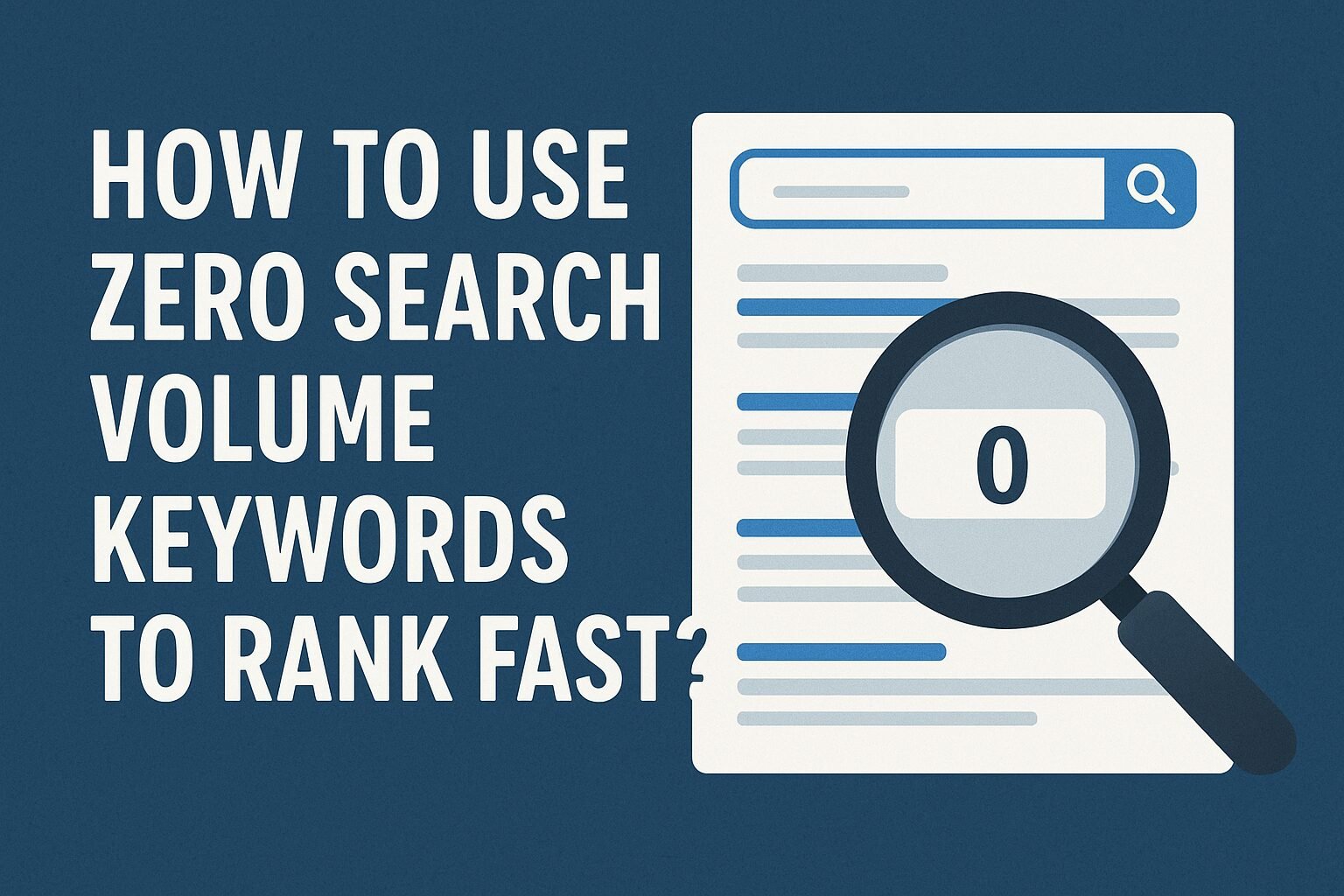If you’ve been working on SEO for any amount of time, you’ve probably heard that the key to success lies in targeting high-volume keywords. The logic sounds simple: if thousands of people are searching for a phrase every month, then ranking for it should bring you massive traffic.
But here’s the problem—you’re not the only one thinking this way. High-volume keywords are like overcrowded highways. Every competitor, big and small, is fighting for the same space, spending thousands of dollars on backlinks, content, and technical SEO just to grab a share of that traffic.
For smaller websites, bloggers, and businesses, this path is not just difficult—it’s almost impossible. That’s why the smartest SEOs have started turning to a different strategy: Zero Search Volume (ZSV) keywords.
According to Neil Patel, Going after the low-hanging fruit is common advice in the SEO world, and I agree with it. If you’re not familiar with this method, it means focusing on keywords that are easier to see success with rather than going to the highest-competition option. This can mean going for easy-to-rank keywords that can deliver fast and effective ways to get more traffic with minimum effort.
Zero Search Volume keywords don’t look attractive on paper. SEO tools like Ahrefs or SEMrush will often show them as having 0 searches per month. Most people ignore them. But in reality, these are untapped goldmines—hidden queries that can help you rank quickly, bring in targeted traffic, and build topical authority faster than going after the big terms.
In this guide, you’ll discover:
- What zero search volume keywords really are
- Why they’re so powerful for fast rankings
- How to find them (with free and paid tools)
- Proven strategies to use them in your content
- Real examples of ZSV keywords driving traffic
- Best practices and mistakes to avoid
By the end, you’ll have a blueprint for leveraging ZSV keywords to dominate your niche—even if your website is brand new.
What Are Zero Search Volume Keywords?
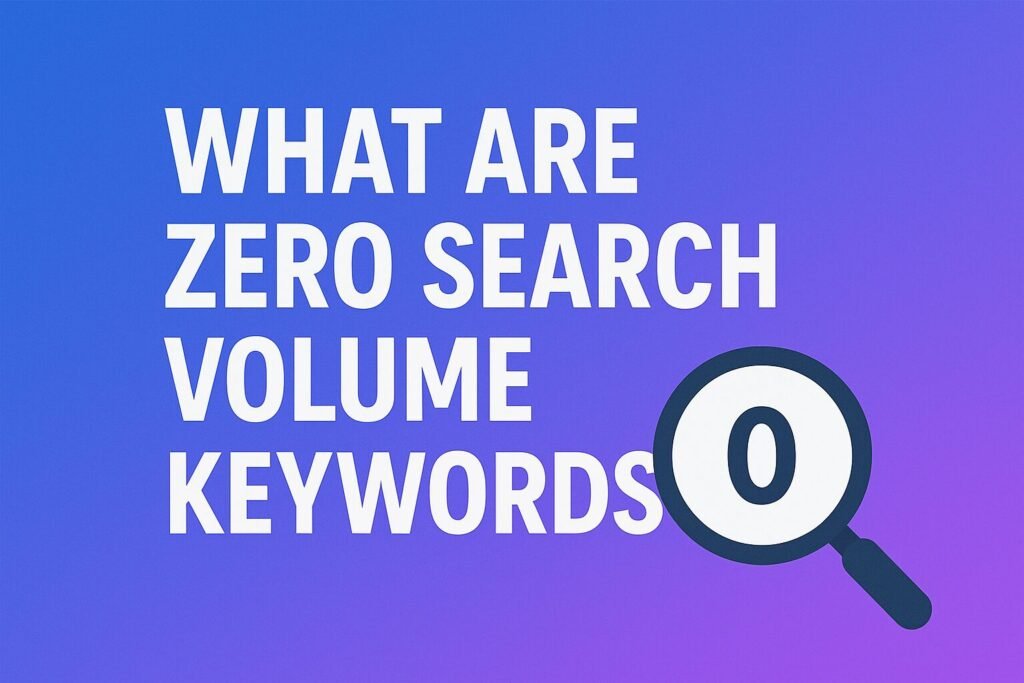
Zero Search Volume keywords are search queries that appear to have no measurable traffic according to keyword research tools. For example, when you look up “how to connect GoDaddy domain to Hostinger” in Ahrefs, it might say 0 searches per month.
But here’s the twist: tools don’t capture every search made on Google. Google processes over 8.5 billion searches per day and admits that 15% of them are brand new queries that have never been searched before. That means millions of searches are happening every single day that no SEO tool can predict.
So when a keyword shows as “zero volume,” it doesn’t literally mean no one is searching for it. It just means the search volume is too small for tools to track. But in real life, users are still typing those queries—and if you’re the only website answering them, guess who gets the click?
Examples of Zero Search Volume Keywords
- Long-tail searches: “best budget noise cancelling headphones for travel 2025”
- Very specific problems: “fix invalid nameserver error in GoDaddy”
- Localized searches: “best veg thali restaurant near Malviya Nagar Jaipur”
- Emerging trends: “AI video editor for YouTube Shorts”
- Product queries: “iPhone 16 Pro Max overheating issue fix”
Notice how these are much more specific than broad, high-volume terms like “headphones” or “restaurants near me.” That specificity is exactly what makes them powerful.
Why Zero Search Volume Keywords Work
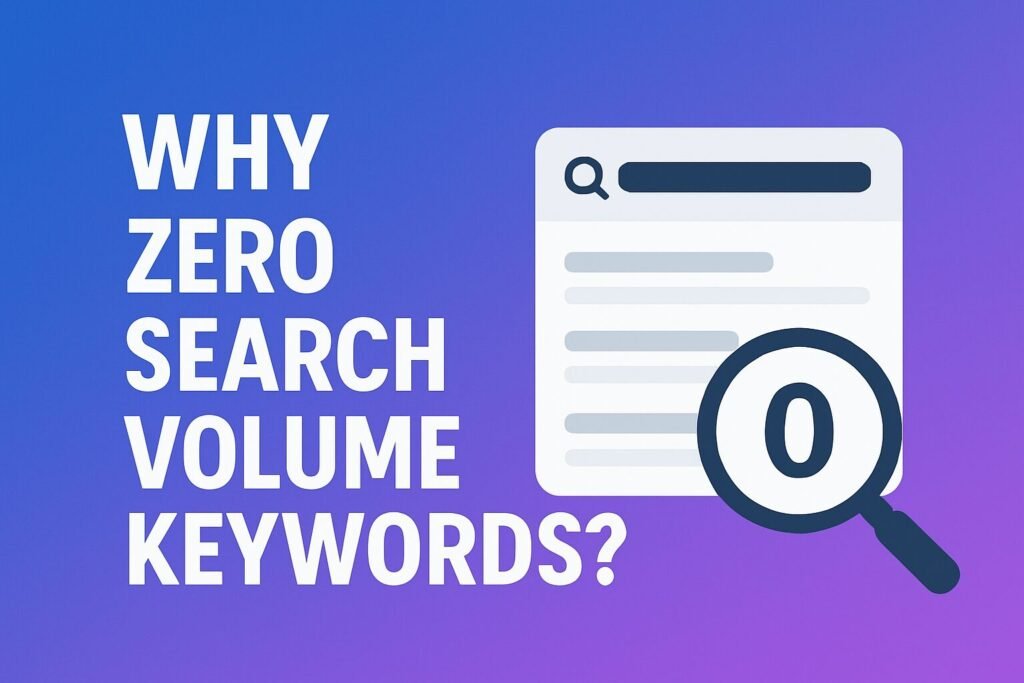
Most people ignore ZSV keywords because they want big traffic numbers. But if you think strategically, you’ll realize ZSVs offer benefits that big keywords never can.
1. They Have Almost Zero Competition
When you target a keyword with 50,000 searches per month, you’re competing with huge sites like Forbes, HubSpot, or Amazon. When you target a keyword with 0–10 searches, most of the time nobody has written a proper article about it. That means you can rank with minimal effort, often within days or weeks.
2. They Capture Real User Intent
Someone searching for “shoes” might just be browsing. But someone searching for “best running shoes for women with knee pain” is ready to buy. That’s the magic of ZSV keywords: they are intent-driven, not vanity-driven.
3. They Help You Rank Faster
Google loves fresh, helpful content. If you’re one of the few (or only) sites answering a query, Google has no choice but to rank you high. Instead of waiting months for results, you could start seeing traffic in days.
4. They Build Topical Authority
When you consistently publish content around small, specific queries in your niche, Google begins to see your site as an authority on the subject. Over time, this authority spills over, helping you rank for bigger, more competitive keywords.
Think of it as building your foundation with small bricks (ZSV keywords). Eventually, the skyscraper (your high-volume rankings) becomes possible.
How to Find Zero Search Volume Keywords
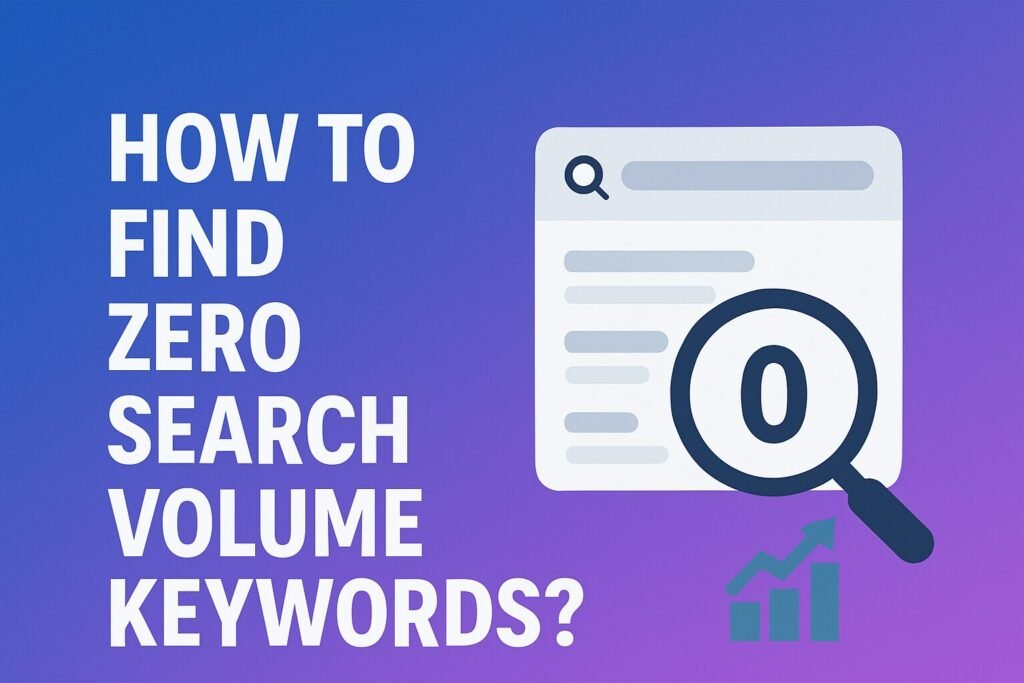
Finding ZSV keywords is easier than most people think—you just have to look in the right places.
1. Use Google Autocomplete and People Also Ask
Start typing a keyword in Google, and watch what the autocomplete shows. These are real searches made by real people. For example, type “how to rank website” and you might see:
- how to rank website fast
- how to rank website without backlinks
- how to rank website on Google free
Scroll further down, and you’ll see the People Also Ask section. These questions are a goldmine of ZSV keywords.
2. Explore Forums and Communities
People often ask questions in places like Reddit, Quora, and niche Facebook groups that never show up in keyword tools. If you see the same question being asked repeatedly, chances are there’s hidden search volume for it.
Example: On a Reddit thread about hosting, someone might ask: “Why does my GoDaddy DNS keep showing invalid?” That’s a perfect ZSV keyword.
3. Check Google Search Console (GSC)
If you already have a website, your GSC is a free treasure chest. It shows queries your site is already getting impressions for. Many of these will be ZSV keywords you can create new articles around.
4. Use Tools Like AnswerThePublic and AlsoAsked
These tools generate hundreds of question-based queries around any topic. Most of them will show as “zero volume” in SEO tools but are still searched.
5. Look at Competitors’ Long-Tail Keywords
Using Ahrefs or SEMrush, you can spy on competitors. Filter their organic keywords to show 0–10 volume, and you’ll find tons of hidden gems they’re ranking for without effort.
How to Use Zero Search Volume Keywords to Rank Fast
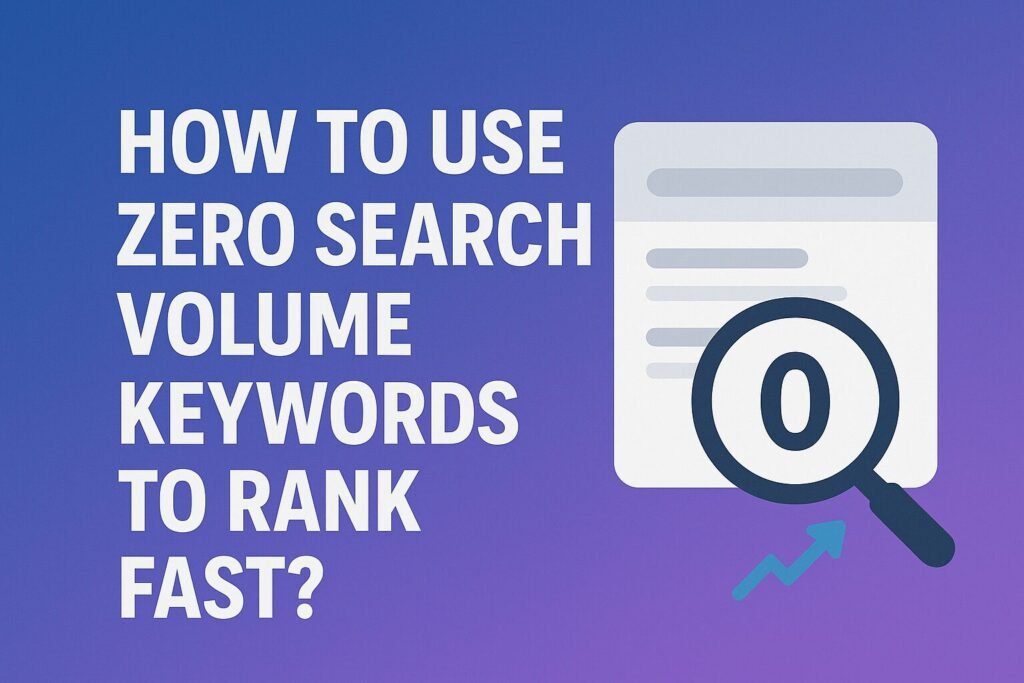
Now that you know how to find them, let’s talk about how to actually use ZSV keywords to your advantage.
Step 1: Choose Keywords with Real Intent
Not all ZSV keywords are valuable. Some may be too obscure. The key is to focus on queries that:
- Solve a real problem
- Indicate purchase or action intent
- Fit naturally into your niche
For example, if you run a fitness site, “best workout shoes for flat feet 2025” is more valuable than “how many sit-ups does Chris Hemsworth do.”
Step 2: Create Content That Directly Answers the Query
When you write an article for a ZSV keyword:
- Use the keyword naturally in your H1, H2, and throughout the article
- Answer the question clearly in the first 100 words
- Use lists, step-by-step instructions, and FAQs to make it scannable
- Add supporting media like images or infographics
This makes your content Google-friendly and voice-search ready.
Step 3: Optimize for Voice Search
Many ZSV queries are conversational. People might say, “Hey Google, how do I fix the invalid nameserver error in GoDaddy?”
To optimize for voice search:
- Write in natural, conversational language
- Include question-style H2s like “How do I fix…”
- Provide short, direct answers (30–50 words) that could be featured snippets
Step 4: Build Content Clusters Around Zero Search Volume Keywords
Instead of just targeting one keyword, build a cluster of related topics.
Example cluster for hosting niche:
- How to connect GoDaddy domain to Hostinger
- Why does GoDaddy say my nameserver is invalid?
- Step-by-step guide to Hostinger DNS setup
- Fixing common domain setup errors in GoDaddy
Interlink all these articles together, and link them to a pillar post like “Complete Guide to Domain Setup.” This signals to Google that you’re an authority on the subject.
Step 5: Promote and Index Quickly
Publishing isn’t enough. To make sure Google finds your article fast:
- Submit the URL in Google Search Console → “Request Indexing”
- Share the article on niche forums, Quora, or Reddit threads
- Repurpose it into a YouTube video or social post for extra exposure
Find “0-SV” Ideas
Mine forums, Reddit, X, YT comments & long-tail autosuggest. Look for product names, errors, comparisons, and ultra-specific tasks.
Validate Intent
Google it. Ensure clear intent, weak competition, and SERP types you can satisfy (how-to, forum, list, etc.).
Publish Smart
Use the exact phrase in title, H1, intro, and one sub-heading. Add screenshots, FAQs, and internal links.
Scale & Cluster
Group related 0-SV terms into a cluster. Interlink pages and later target the parent keyword.
Real-Life Example: Zero Search Volume Keywords in Action
Let’s say you run a small fitness blog. Competing for “best protein powder” (50,000+ monthly searches) is impossible—you’ll be buried under Healthline, Men’s Health, and Amazon.
But instead, you publish articles on:
- “Best vegan protein powder for Indian women”
- “Does protein powder cause hair fall in females?”
- “Best protein powder for diabetics in India”
Each of these shows 0 volume in tools, but you start getting clicks within weeks. Why? Because real people have those questions. Over time, as you publish more of these, your site builds authority on “protein powder.” Eventually, you start ranking for bigger keywords like “best protein powder for women.”
That’s how ZSV keywords act as stepping stones to bigger rankings.
Common Mistakes to Avoid with Zero Search Volume Keywords
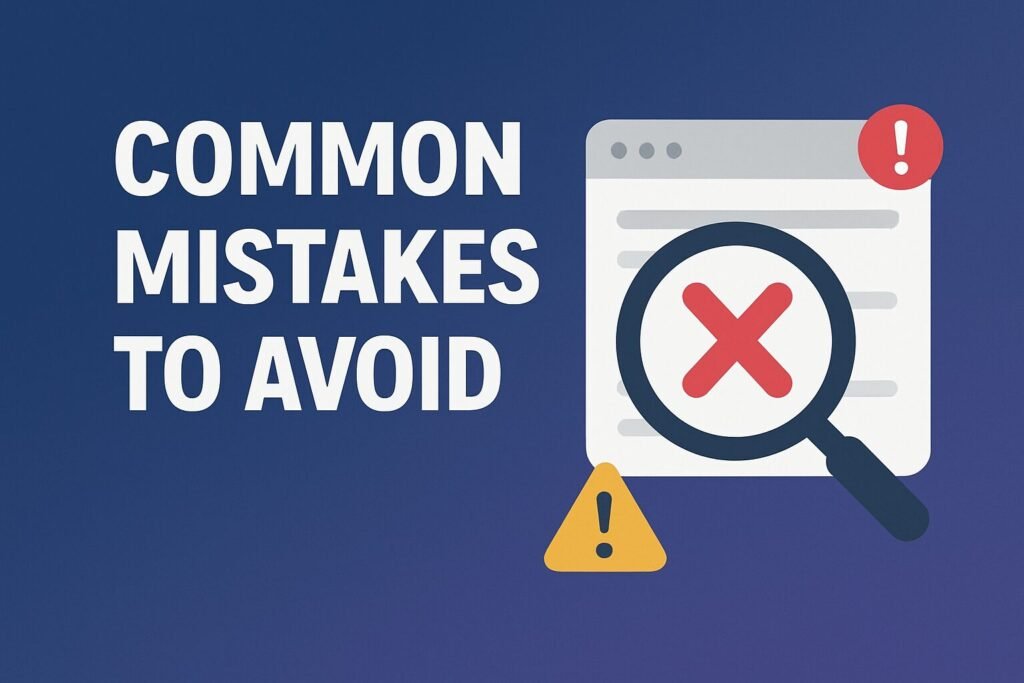
- Targeting irrelevant ZSV keywords: Just because it’s low competition doesn’t mean it’s useful. Stay aligned with your niche.
- Keyword stuffing: Using the keyword unnaturally kills user experience. Write for humans first.
- Publishing one-off articles: Build clusters instead of isolated content.
- Ignoring intent: If the query is informational, don’t try to sell right away. If it’s commercial, make sure you provide recommendations.
- Not tracking results: Use GSC to measure impressions and clicks, otherwise you won’t know what’s working.
Best Practices to Dominate with Zero Search Volume Keywords
- Write comprehensive articles (1500–2500 words), even for low-volume queries.
- Use schema markup (FAQ, How-to) to grab rich snippets.
- Repurpose content into videos, reels, and infographics for omnichannel exposure.
- Continuously update old ZSV articles with new insights to keep rankings fresh.
Conclusion: Small Keywords, Big Results
Zero Search Volume keywords may seem insignificant at first glance, but in reality, they are the secret weapon of smart SEOs. They allow you to bypass competition, rank faster, capture intent-driven traffic, and build topical authority in your niche.
If you’re tired of struggling for years to rank for high-volume terms, shift your strategy today. Start targeting ZSV keywords consistently. Build clusters, optimize for voice search, and track your results.
If you struggle with writing SEO Oriented and SEO Friendly Blog posts, You can read How to Write SEO-Friendly Blog Posts. This will be a huge help for you and your blog.
Remember, in SEO, it’s not about chasing traffic numbers—it’s about chasing intent and authority. And zero search volume keywords are the shortcut to both.
Frequently Asked Questions
1. What are zero search volume keywords?
Zero search volume keywords are search queries that keyword research tools show as having little or no monthly searches. However, this doesn’t mean no one is searching for them. Tools often miss long-tail, niche, and newly emerging queries. Real users are still typing these into Google, which makes them valuable opportunities for ranking.
2. Are zero search volume keywords worth targeting?
Yes, absolutely. These keywords typically have very low competition, which means you can rank much faster compared to high-volume terms. They also tend to be highly specific, which makes the traffic you receive more qualified and intent-driven.
3. How do I find zero search volume keywords?
You can discover them by:
- Using Google Autocomplete and People Also Ask sections
- Exploring forums like Reddit, Quora, and niche communities
- Checking Google Search Console for hidden queries
- Using tools like AnswerThePublic, AlsoAsked, Ahrefs, or SEMrush
- Analyzing competitors’ low-volume keywords
4. Do zero search volume keywords really bring traffic?
Yes. Just because a keyword shows as “0” in a tool doesn’t mean no one searches for it. SEO tools rely on third-party data and sampling—they cannot track every single query. Many SEOs have proven that ZSV keywords generate consistent clicks and even conversions.
5. Can I rank for high-volume keywords by targeting ZSV first?
Definitely. By consistently targeting ZSV keywords around a topic, you build topical authority in Google’s eyes. Over time, this authority increases your chances of ranking for medium and even high-volume keywords. Think of ZSV keywords as stepping stones toward larger SEO wins.
